用现在进行时表示将来-超级经典
用现在进行时表将来

英语中大家对be going to和will(shall)+动词的形式都表示将来意义这个知识点并不陌生。
比如:I’m going to Japan next week.=I will go to Japan next week.我下周将要去日本。
be going to是现在进行时的结构,但是时态表示将来。
今天我将要继续分享“am/is/are+ doing”是现在进行时的结构,通常表示“现在”这个时间里“正在”发生的动作。
但是表示暂时性动作的动词,通常情况下,可以用现在进行时表示将来。
英语中表示暂时性动作,常用进行时表示将来的动词有come,go,arrive,leave,start,fly,die等。
比如:Don’t worry. The train is arriving here soon. 别着急,火车马上就到了。
We’re leaving Beijing for home. 我们就要离开北京回家了。
这种用法所用的动词多是位移动词。
所谓位移动词顾名思义就是位置上会发生改变,比如come,go,leave。
并且这类词不止能用现在进行时表示将来。
比如:He’s leaving for Shanghai.He’ll leave for Shanghai.同时现在进行时也可用于某种非位移动词。
比如:I’m meeting you after school. 放学后我见你。
What are you doing next Sunday?下星期天你要干什么?初中阶段用现在进行时表将来的位移动词和非位移动词汇总如下,同学们可特殊记忆。
接下来我们看一道现在进行时表将来的易错题:The engineer is returning from Hong Kong _____ a few days.A. sinceB. forC. inD. after很多同学一看选D,正确答案C。
解析:is returning是现在进行时表示将来。
现在进行时表将来
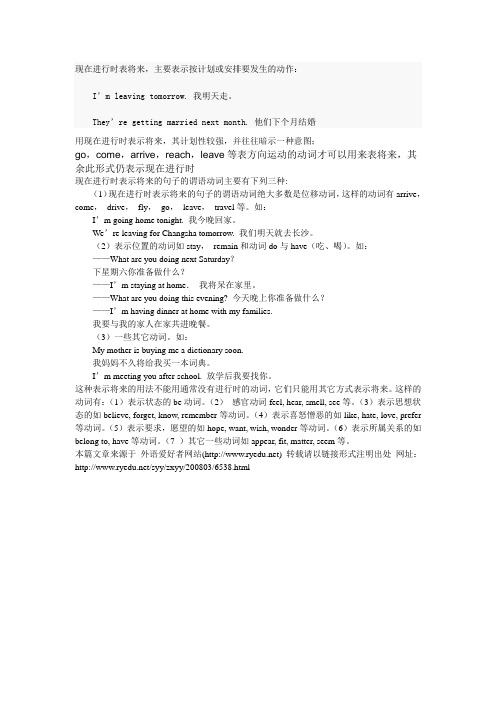
现在进行时表将来,主要表示按计划或安排要发生的动作:I’m leaving tomorrow. 我明天走。
They’re getting married next month. 他们下个月结婚用现在进行时表示将来,其计划性较强,并往往暗示一种意图;go,come,arrive,reach,leave等表方向运动的动词才可以用来表将来,其余此形式仍表示现在进行时现在进行时表示将来的句子的谓语动词主要有下列三种:(1)现在进行时表示将来的句子的谓语动词绝大多数是位移动词,这样的动词有arrive,come,drive,fly,go,leave,travel等。
如:I’m going home tonight. 我今晚回家。
We’re leaving for Changsha tomorrow. 我们明天就去长沙。
(2)表示位置的动词如stay,remain和动词do与have(吃、喝)。
如:——What are you doing next Saturday?下星期六你准备做什么?——I’m staying at home.我将呆在家里。
——What are you doing this evening? 今天晚上你准备做什么?——I’m having dinner at home with my families.我要与我的家人在家共进晚餐。
(3)一些其它动词。
如:My mother is buying me a dictionary soon.我妈妈不久将给我买一本词典。
I’m meeting you after school. 放学后我要找你。
这种表示将来的用法不能用通常没有进行时的动词,它们只能用其它方式表示将来。
这样的动词有:(1)表示状态的be动词。
(2)感官动词feel, hear, smell, see等。
(3)表示思想状态的如believe, forget, know, remember等动词。
用现在进行时表示将来

用现在进行时表示将来意为:"意图"、"打算"、"安排"、常用于人。
常用词为come, go, start, arrive, leave, stay 等。
I'm leaving tomorrow.Are you staying here till next week?现在进行时除表示现在外,还可表示将来,常有\"意图\"、\"安排\"或\"打算\"的含义。
这种用法比较生动,给人一种期待感。
它常表示最近或较近的将来,所使用的动词多是转移动词。
如: I\'m going. 我就要走了。
We\'re leaving for Beijing tomorrow. 我们明天就去北京。
When are you starting? 你们什么时候动身?They are coming here this afternoon. 他们今天下午来这儿。
表示将来的现在进行时除用于转移动词外,也可用于某些非转移动词。
如:What are you doing next Sunday? 下星期天你打算干什么?My mother is buying me a bike soon. 我妈妈不久将给我买一辆自行车。
I'm meeting you after class. 课后我要找你。
偶尔也表示较远的将来。
如:When I grow up, I\'m joining the army. 我长大了要参军。
表示将来的现在进行时有时含有\"决心\"的意思,多用于否定结构中。
如:I\'m not going there. 我不去那儿了。
I\'m not waiting for him any longer. 我不再等他了。
用这种进行时与对方讲话时可变成命令,不过语气比较温和。
一般现在进行时表将来的用法

一般现在进行时表将来的用法1. 哎呀呀,你知道吗,一般现在进行时可以用来表示将来的计划呀!比如说,“I'm leaving tomorrow.”(我明天就走。
)看,这就是在说未来要发生的事情呢。
2. 嘿,一般现在进行时表示将来,就像给未来开了一道特别的门呀!像“She's coming here this evening.”(她今晚要来这里。
)这多直接明了呀。
3. 哇塞,一般现在进行时表将来真的好神奇咧!就好比“I'm meeting him later.”(我一会儿要去见他。
)不就是在说接下来要做的事情嘛。
4. 咦,想想看呀,“We're having a party next week.”(我们下周要举办一个派对。
)这不就是用一般现在进行时表示将来的例子嘛,多好用呀!5. 呀,一般现在进行时这样用,那可太酷啦!比如说“They're visiting us next month.”(他们下个月要来看我们。
)简单又实用呢。
6. 哟呵,难道你还没发现一般现在进行时表示将来的妙处么?像“He's going on a trip soon.”(他很快要去旅行。
)多形象呀。
7. 哈哈,一般现在进行时表将来真的太有意思啦!“They're moving to a new house next year.”(他们明年要搬到新房子里。
)不就是这样嘛。
8. 哇哦,一般现在进行时能这么来表示将来,真是绝了呀!“I'm starting my new job next month.”(我下个月要开始我的新工作。
)是不是很清晰呀。
我的观点:一般现在进行时表将来是英语中一种很特别又实用的用法,我们要好好掌握它,能让我们的表达更丰富多样呢!。
现在进行时表将来

His daughter is to get married soon. No one is to leave the building.
4. be about to+do 表即将发生的动作,不与表 示将来的时间状语连用。
I was about to leave when the telephone rang.
to China next week.
We are moving to a new building in the centre of the city.
2. 表示交通方式、行程安排的动词,如 fly, walk, ride, drive, take (a bus, a taxi) 等的现在 进行时也经常用于表示将来。
The scientist is flying to Shanghai next week.
My bicycle is broken, so I’m walking to the cinema.
Hale Waihona Puke 其他几种表示将来的动作或状态的形式:
1. will / shall+do 表接下来要发生或是客观上的将来。
Have a nice day!
5. 按固定时间表要发生的未来动作,仅限于动词 come, go, leave, move, start, return, arrive, begin stay 等。
一般现在时表示将来时。
The movie starts at eight o’clock this evening. 对比:The plane takes off at 10:10. That is, it’s leaving in ten minutes.
8:30之前赶到机场。
现在进行时表将来111111
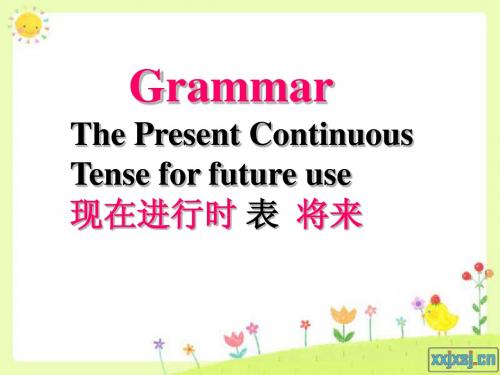
(2) 用在状语从句中用一般现在时代替将来时。 If you do that again, I’ll hit you.
同一般现在时一样,现在进行时也可用在时间, 条件或原因状语中表将来. 1.When you are passing my way, please drop in. 你什么时候路过我家,请进来坐。 2.If they are not doing it, what am I to do? 假如他们不干,那我该怎么办。 3.She is going to the dentist tomorrow because she is having a tooth filled。 她明天要去看牙医,因为她要补牙。
她总是先想到别人。
4. 现在进行时be doing表示将来
现在进行时可用来表示一个在最近按计划或 打算要进行的动作;通常带一个表将来的时间 状语, 但有明确的上下文时无须指出时间。 能用进行时表将来的动词: go, come, leave, start, arrive, give, return, sleep ,stay, play, do, take, get, see off, travel, fly, drive, walk, reach, meet…
④ be about to+动词原形,表示即将发生的动作, 不与表示将来的时间状语连用。 I was about to go swimming when my guide
shouted at me and told me not to do so. 我正要去游泳, 这时向导大声叫我不要去。 ⑤一般现在时表示将来时 (1) come, go, leave, move, start, return, arrive, begin, stay等动词表示的是航班,轮船等时间表 时,用一般现在时表将来。 The plane takes off at 10:10. That is, it’s leaving in ten minutes.
现在进行时表将来的例句

现在进行时表将来的例句以现在进行时表将来的例句:
1. 我正在准备明天的演讲稿。
2. 他们正在安排下周的会议时间。
3. 我们正在讨论下个月的项目计划。
4. 她正在制定明年的财务预算。
5. 我们正在筹备即将到来的展览活动。
6. 他们正在安排明天的客户会议。
7. 我们正在制定未来三个月的市场营销计划。
8. 我正在准备下周的面试。
9. 他们正在讨论明年的公司发展战略。
10. 我们正在安排下个季度的员工培训计划。
1. 我正在规划未来的旅行行程。
2. 他们正在准备明天的产品发布会。
3. 我们正在筹备下个月的团建活动。
4. 她正在安排明年的员工晋升计划。
5. 我们正在讨论即将到来的合作项目。
6. 他们正在制定明天的市场调研计划。
7. 我们正在安排未来三个月的新产品上市计划。
8. 我正在准备下周的销售报告。
9. 他们正在讨论明年的公司年会安排。
10. 我们正在筹备下个季度的新店开业活动。
1. 我正在规划未来的学习计划。
2. 他们正在准备明天的团队培训课程。
3. 我们正在筹备下个月的志愿者活动。
4. 她正在安排明年的学术交流计划。
5. 我们正在讨论即将到来的科研项目。
6. 他们正在制定明天的实验方案。
7. 我们正在安排未来三个月的学术会议。
8. 我正在准备下周的论文写作。
9. 他们正在讨论明年的研究方向。
10. 我们正在筹备下个季度的学术讲座。
现在进行时表示将来
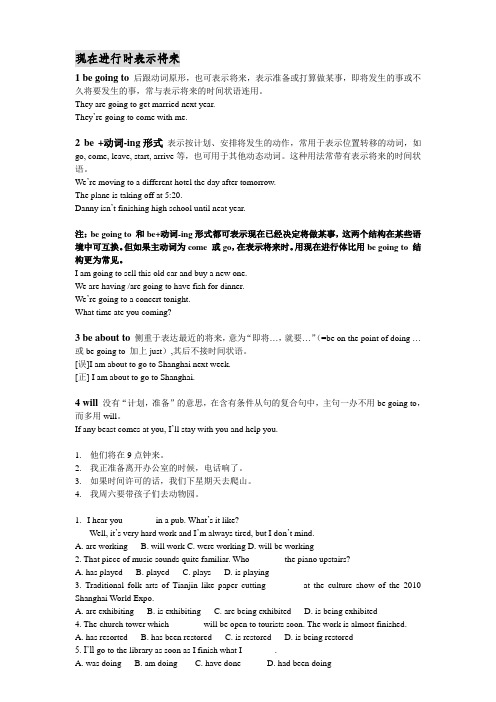
现在进行时表示将来1 be going to后跟动词原形,也可表示将来,表示准备或打算做某事,即将发生的事或不久将要发生的事,常与表示将来的时间状语连用。
They are going to get married next year.They’re going to come with me.2 be +动词-ing形式表示按计划、安排将发生的动作,常用于表示位置转移的动词,如go, come, leave, start, arrive等,也可用于其他动态动词。
这种用法常带有表示将来的时间状语。
We’re moving to a different hotel the day after tomorrow.The plane is taking off at 5:20.Danny isn’t finishing high school until neat year.注:be going to 和be+动词-ing形式都可表示现在已经决定将做某事,这两个结构在某些语境中可互换。
但如果主动词为come 或go,在表示将来时。
用现在进行体比用be going to 结构更为常见。
I am going to sell this old car and buy a new one.We are having /are going to have fish for dinner.We’re going to a concert tonight.What time ate you coming?3 be about to侧重于表达最近的将来,意为“即将…,就要…”(=be on the point of doing …或be going to 加上just),其后不接时间状语。
[误]I am about to go to Shanghai next week.[正] I am about to go to Shanghai.4 will没有“计划,准备”的意思,在含有条件从句的复合句中,主句一办不用be going to,而多用will。
(完整版)现在进行时表将来(知识梳理)

现在进行时表将来概念引入现在进行时是我们非常熟悉的时态,常表示说话时正在发生的动作,如:Why are you crying? Is something wrong? 你为什么在哭?有什么不对吗?但是观察这些句子:1. I’m going. 我要走了。
2. What are you doing next Sunday? 下星期你打算干什么?3. Don’t forget: you are taking part too. 不要忘记:你也要参加。
4. She is going to the dentist tomorrow because she is having a tooth filled.她明天要去看牙医,因为她的牙需要补。
这些句子中的谓语动词都是现在进行时,但是谈论的都是将来的事,这就是本单元我们要学习的内容。
语法讲解现在进行时表将来1. 现在进行时表示将来主要用于表示按照计划或安排将要发生的动作或事件,常表示最近或较近的将来,有“意图”、“安排”或“打算”,给人期待感,多是转移动词,如:come, go, start, arrive, leave, stay等。
I’m leaving tomorrow. 我打算明天离开。
Are you staying here till next week? 你要在这儿待到下个星期吗?They’re coming here this afternoon. 今天下午他们要来这儿。
She is leaving on the New York flight. 她要乘飞纽约的航班去。
Do you know if he is going to school tomorrow? 你知道明天他上不上学吗?What time are you coming back? 你准备什么时候回来?I am starting early tomorrow morning. 我打算明天一早就动身。
现在进行时表将来

现在进行时表将来引言在英语语法中,现在进行时表示正在进行的动作,通常用于表达现在正在发生的事情。
然而,有时现在进行时也可以用来表示将来发生的事件。
本文将会详细介绍如何使用现在进行时来表达将来。
使用现在进行时表将来一般来说,现在进行时主要用于描述现在正在进行的动作,如:•The children are playing in the park.(孩子们正在公园里玩耍。
)•He is studying for his exams.(他正在为考试学习。
)然而,有时我们也可以使用现在进行时来表达将来时间,特别是当我们想要强调已经被计划或安排的事情。
以下是一些使用现在进行时表达将来的情况:1. 已安排的计划或约定如果我们事先安排了某个动作或约定了一个会面,可以使用现在进行时来表示将来的动作或事件。
例如:•I am meeting my friends for dinner tonight.(我今晚要和朋友们吃晚饭。
)•They are flying to Paris next month.(他们下个月要飞往巴黎。
)2. 种类为“固定安排”的动作“固定安排”指的是按照某种规律或习惯性地重复出现的动作。
在这种情况下,我们也可以使用现在进行时来表达将来。
例如:•We are leaving for the airport at 9 AM tomorrow.(我们明天上午9点出发去机场。
)•The train is arriving in five minutes.(火车将在五分钟后到达。
)3. 表示临时决定或意图有时,当我们做出临时决定或者表示当前的意图时,也可以使用现在进行时来表示将来。
例如:•I am taking a break this afternoon.(今天下午我要休息一下。
)•We are going to see a movie tonight.(我们今晚要去看电影。
)以上是使用现在进行时表达将来的一些常见情况,但并不是唯一的用法。
现在进行时表将来

现在进行时表将来现在进行时表示将来,主要用于表示按计划或安排要发生的动作。
常有“意图”“安排”或“打算”的含义。
这种现在进行时比较生动,给人一种期待感。
它常表最近或较近的将来,所用动词多是转移动词。
表将来的现在进行时除用于转移动词外,亦可用于某些非转移动词。
能这样用的动词常用的有:arrive, come, do, get, go, have, leave, meet, play, return, see, spend, start, stay, wear, work 等。
如:I’m leaving tomorrow. 我明天走。
They’re getting married next month. 他们下个月结婚。
Are you meeting Bill this evening? 你今晚将和比尔见面吗?1) come, go, stay, arrive, leave 等词的现在进行时经常用来表示将来确切的计划。
2) 表示交通方式、行程安排的动词,例如 fly,walk, ride, drive, take(a bus, a taxi)等的现在进行时也经常用于表示将来。
如:但偶尔也表示较远的将来。
如:When I grow up, I’m joining the army. 我长大了要参军3)表将来的现在进行时有时含有“决心”的意思,多用在否定结构中。
如:I’m not going. 我不走了。
I’m not waiting any longer. 我不再等了。
有时也用在肯定结构中。
如:I’m backing out. 我要打退堂鼓了。
4)用这种现在进行时与对方讲话时可变成命令,不过语气比较温和。
如:You are staying. 你留下吧。
Don’t forget: you are taking part too. 不要忘记:你也要参加。
5)现在进行时也可在时间、条件或原因状语从句中表示将来。
现在进行时表将来课件
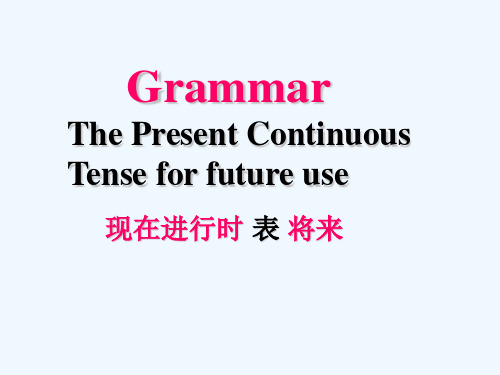
她老是改变主意。
现在进行时除了表示正在进行的情况 外,还可以表示????
Summary
现在进行时表示将来
当句子涉及确切的计划、明确的意图和 为将来安排好的活动时, 现在进行时可用 于表示将来。通常带一个表将来的时间 状语.
e.g. He is leaving for London tomorrow. 并非所有动词用进行时表示将来
2.表示现阶段在进行的情况。
--- What are you doing recently(最近)?
--- I am writing a novel recently.
.
(我最近在写小说。)
时间状语:these days, today, this week, this term…
3. 表示反复性或习惯性的动作,常与always, continually,constantly,fovervr等连用,表 示说话人的赞扬、厌恶、不满和遗憾等 感情色彩。
1.我星期五动身去北京。(leave)
I’m leaving for Beijing this Friday.
2.你能告诉我你今晚要做什么吗?
Could you tell me what you are doing this everning?
3.飞机将于9:20分起飞, 所以我必须在 8:30之前赶到机场。
Lily iiss wwaallkkiinngg to school tomorrow.
The soldier is riding a horse to send the message the day after tomorrow.
2) 表示交通方式、行程安排的动词, 例如 fly, walk, ride, drive, take (a bus, a taxi)等的现在进行时也经常 用于表示将来。
现在进行时表将来

The plane takes off at 10:10. That is , it's leaving in ten minutes.
(2)用在状语从句中用一般现在时代替将来时 If you do that again, I'll hit you.
We are going fishing if it doesn't rain tomorrow.
1) come, go, stay, arrive, leave 等表示位移的 词的现在进行时经常用来表示将来确切的 计划。 I'm leaving tomorrow. 我明天走。 They're getting married next month. 他们下个月结婚。
(2)非位移的词也可以用词用法,如 do,buy,meet,play,publish,这类的词一般要有表 示将来的时间状语。
be to+动词原形:表示按计划要发生的事或 注定将要发生的事情或表示命令、可能性等。 Are we to go on with this work? You are to be back by 9 o'clock. His theory is to change the view on the universe.
一般将来时
will/shall do be going to be to do be about to do 一般现在时表将来 现在进行时表将来
I shall be seventeen years old next month. 第一人称多用于shall,will可用于各种人称 My brother will go to London next week. We are going to have a meeting today. 表示即将发生的或最近打算进行的事。
现在进行时表将来英语语法大全

现在进行时表将来现在进行时表示将来的意义,常有“意图”“安排”或“打算”的含义,这种用法的句子主语通常为人,学习时主要掌握下列三点:一、现在进行时表示将来的用法1.表示对最近的将来确定安排。
如:Gina and Cindy are meeting tonight.吉娜和辛迪今晚要会面。
They are going to Shanghai next week. 他们下个星期要去上海。
——When are you starting? 你们将什么时候动身?——This Sunday. 本周日。
2.表示没有具体安排好细节的决定或计划。
如:I’m not waiting for her any longer. 我不再等她了。
When I grow up, I’m joining the army. 我长大了要参军。
——What are you doing for vacation? 你假期准备做什么?——I’m visiting my friend in Hong Kong.我准备看望我香港的朋友。
3.用在时间或条件状语从句中表示将来的动作,强调动作的持续性。
如:If I am still sleeping when he comes, wake me up, please.他来时如果我还在睡觉,请你唤醒我。
When you are passing my way, please drop in.当你路过我家时,请进来坐坐。
二、谓语动词现在进行时表示将来的句子的谓语动词主要有下列三种:(1)现在进行时表示将来的句子的谓语动词绝大多数是位移动词,这样的动词有arrive,come,drive,fly,go,leave,travel等。
如:I’m going home tonight. 我今晚回家。
We’re leaving for Changsha tomorrow. 我们明天就去长沙。
(2)表示位置的动词如stay,remain和动词do与have(吃、喝)。
现在进行时表将来的用法归纳

现在进行时表将来的用法归纳现在进行时(Present Continuous)在英语中通常用来表示将来发生的动作或计划。
下面是现在进行时表示将来的用法归纳:表示已经安排好的行程、计划或约会:1.I am meeting my friend tomorrow.(我明天要和朋友见面。
)2.They are flying to Paris next week.(他们下周要飞往巴黎。
)表示按照时间表即将发生的事情:1.The train is leaving at 8 o'clock tonight.(火车今晚8点离开。
)2.She is giving a presentation at the conference tomorrow morning.(她明天早上在会议上做报告。
)表示当前计划或安排的未来事件:1.I am taking a vacation next month.(我下个月要度假。
)2.They are moving to a new house next week.(他们下周要搬到新房子。
)表示非正式的意图或打算:1.I am thinking of going shopping later.(我打算晚些时候去购物。
)2.We are planning to have a picnic this weekend.(我们计划这个周末去野餐。
)需要注意的是,现在进行时表示将来时,通常应有明确的时间状语、上下文或其他线索来表明动作发生的时间是在未来。
另外,有些动词(如arrive、leave、start等)在表示将来时时常用现在进行时,而不是一般将来时形式。
例如:1.They are leaving for the airport at 6 p.m.(他们将于下午6点离开去机场。
)2.She is starting her new job next Monday.(她下周一开始新工作。
现在进行时表将来
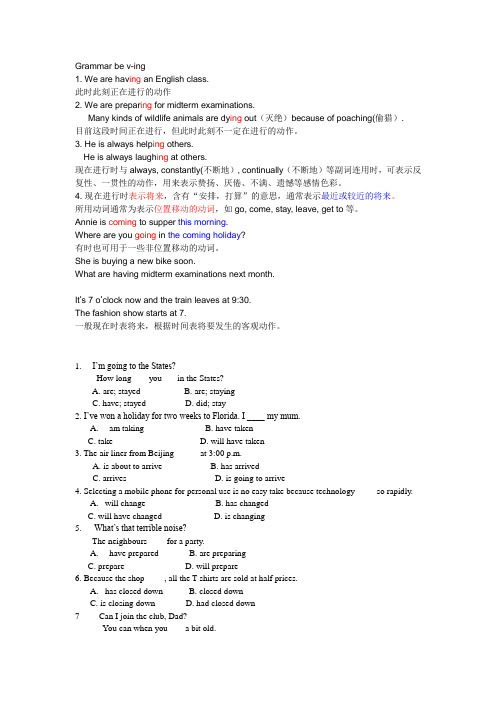
Grammar be v-ing1. We are hav ing an English class.此时此刻正在进行的动作2. We are prepar ing for midterm examinations.Many kinds of wildlife animals are dy ing out(灭绝)because of poaching(偷猎).目前这段时间正在进行,但此时此刻不一定在进行的动作。
3. He is always help ing others.He is always laugh ing at others.现在进行时与always, constantly(不断地), continually(不断地)等副词连用时,可表示反复性、一贯性的动作,用来表示赞扬、厌倦、不满、遗憾等感情色彩。
4. 现在进行时表示将来,含有“安排,打算”的意思,通常表示最近或较近的将来。
所用动词通常为表示位置移动的动词,如go, come, stay, leave, get to等。
Annie is coming to supper this morning.Where are you going in the coming holiday?有时也可用于一些非位置移动的动词。
She is buying a new bike soon.What are having midterm examinations next month.It’s 7 o’clock now and the train leaves at 9:30.The fashion show starts at 7.一般现在时表将来,根据时间表将要发生的客观动作。
1. ---I’m going to the States?---How long ___ you___ in the States?A. are; stayedB. are; stayingC. have; stayedD. did; stay2. I’ve won a holiday for two weeks to Florida. I ____ my mum.A.am takingB. have takenC. takeD. will have taken3. The air liner from Beijing _____ at 3:00 p.m.A. is about to arriveB. has arrivedC. arrivesD. is going to arrive4. Selecting a mobile phone for personal use is no easy take because technology ____ so rapidly.A.will changeB. has changedC. will have changedD. is changing5. --- What’s that terrible noise?---The neighbours____ for a party.A.have preparedB. are preparingC. prepareD. will prepare6. Because the shop ____, all the T-shirts are sold at half prices.A.has closed downB. closed downC. is closing downD. had closed down7 --- Can I join the club, Dad?--- You can when you ___ a bit old.A.getB. will getC. are gettingD. will have got8 ---There is a knock on the door.---I _______ the door.A. openB. will openC. am openingD. am to open. 有人敲门,我(愿意)去开。
现在进行时表将来
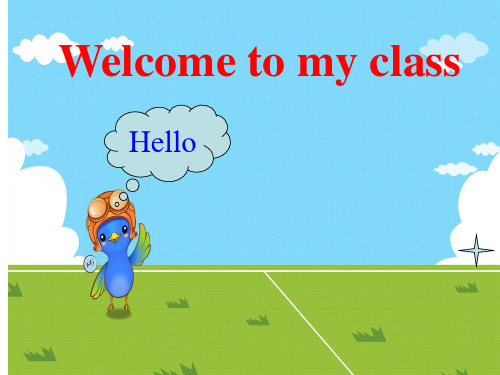
③ be to do:表示按计划要发生的事或征 求对方意见或表示将来必然要发生 的事(译作“注定…”)。 Are we to go on with the work? He is to be a dancer.
4.be about to do 意为“刚要,正要”,表
示非常近的将来。不与表示将来的时间
are meeting them outside the theatre 1.We were at 7 so I have to leave now. F
2.Mr. Green is leaveing the kids with leaving Grandma next Saturday. F 3.They will have a party on Saturday, you’re very welcome to come. T
tomorrow.
2. 表示交通方式、行程安排的动词,例
如 fly, walk, ride, drive, take (a bus, a
taxi)等现在进行时也经常用于表示将来
。
Tom is flying to Shanghai next Sunday.
We are taking the midterm exam soon.
Welcome to my class
Hello
现在进行时
Be (am , is ,are ) + v. ing
现在进行时
1. 表示说话时正在进行的动作或存在的状态。 We are waiting for you now. Look ! The boy is speaking English. 时间状语:now, at this moment…
状语连用。(但常与when连用)
现在进行时表将来

Exercise 2
Travel Plan
The Browns a_r_e__g_o_in_g_ (go) to the
North China by train next week.
They _a_re__s_ta_y_i_n_g_ (stay) in Beijing
for a week. They _a_re__g_o_in_g_ (go) to
Xi’an. They _a_re__g_e_tt_i_n_g_ (get) there
by air.
R: Miss Wang, I hear that you_a_r_e_t_r_a_v_e_lling (travel) along the Mekong River. Have you got everything ready
B: I’m singing songs with e doing表示将来
现在进行时可用来表示一个在最近按计划或 安排打算要进行的动作;通常带一个表将来的 时间状语, 但有明确的上下文时无须指出时间。
能用进行时表将来的动词(并非所有动词): go, e, leave, start, arrive, give, return, sleep ,stay, play, do, take, get, see off, travel, fly, drive, walk, reach, meet…
▪ The next train leaves at 9:15.
注意
另外,表示将来的动作或状态,还可用以下几种形
式: ① will / shall+动词原形: 不以主观意志为转移 的,客观的。
- 1、下载文档前请自行甄别文档内容的完整性,平台不提供额外的编辑、内容补充、找答案等附加服务。
- 2、"仅部分预览"的文档,不可在线预览部分如存在完整性等问题,可反馈申请退款(可完整预览的文档不适用该条件!)。
- 3、如文档侵犯您的权益,请联系客服反馈,我们会尽快为您处理(人工客服工作时间:9:00-18:30)。
用现在进行时表示将来2009-11-11 09:20:31| 分类:Grammar 语法| 标签:|字号大中小订阅Grammar--用现在进行时表示将来当句子涉及确切的计划、明确的意图和为将来安排好的活动时,现在进行时可用于表示将来。
1) come, go, stay, arrive, leave 等词的现在进行时经常用于表示将来确切的计划。
2) 表示交通方式、行程安排的动词,例如fly,walk, ride, drive, take(a bus, a taxi)等的现在进行时也经常用于表示将来。
练一练!1. Betty __________(leave) for Guangzhou by plane at 3 this afternoon. Her brother Bob _________(see) her off. It’s half past one now. They____________ (wait) for a taxi outside the school gate.2. The Browns __________ (go) to the North China by train next week. They _________ (stay) in Beijing for a week. They ________(go) to Xi’an. They ____________(ge t) there by air.3. Some friends___________ (come) to Anne’s birthday party this evening. Anne’s mother ___ (be) busy ______ (get) ready for the birthday dinner. Anne _________(help) her mother now.is leaving, is seeing, are waiting, are going, are stayi ng, are going, are getting, are coming, is… getting, is helping注意!另外,表示将来的动作或状态,还可用以下几种形式:①will / shall+动词原形I shall be seventeen years old next month.②be going to+动词原形:表示即将发生的或最近打算进行的事。
We are going to have a meeting today.③be to+动词原形:表示按计划要发生的事或征求对方意见。
Are we to go on with this work?④be about to+动词原形,表示即将发生的动作,不与表示将来的时间状语连用。
I was about to go swimming when my guide shouted at me and told me not to do so.我正要去游泳,这时向导大声叫我不要去。
⑤be +动词的ing形式:表示按计划或安排要发生的事, 含义是“预定要……” 这一结构常用趋向动词go, arrive, come , leave, start, stay , return 和play , do , have , work, wear, spend , see, meet等。
--- When are you going off for your holiday?你什么时候动身去度假?--- My plane is taking off at 9:20, so I must be at the airport by 8:30.我乘坐的飞机将于9:20分起飞, 所以我必须在8:30之前赶到机场.⑥一般现在时表示将来时(1)按规定预计要发生的未来动作,仅限于动词come, go, leave, move, start, return, arrive, begin, stay等动词.The plane takes off at 10:10. That is , it’s leaving in ten minutes.(2)用在状语从句中用一般现在时代替将来时If you do that again, I’ll hit you.(3)用在I bet 和I hope后面, 常用一般现在时表将来.I bet you don’t get up before ten tomorrow.我敢说你明天不到10点是不会起床的.⑦单纯叙述未来的事实,可以用将来进行时,也可表示按计划安排将来要执行的动作。
实例:At this time tomorrow __ B ____ over the Atlantic.(2003北京)A. we’re going to flyB. we’ll be flyingC. we’ll flyD. we're to fly练一练!1. ---Did you write to Grace last summer?---No, but I'll ______ her over Christmas vacation.A. be seenB. have seenC. be seeingD. to see2. ---I’m going to the States?---How long ___ you___ in the States?A. are; stayedB. are; stayingC. have; stayedD. did; stay3. I’ve won a holiday for two weeks to Florida. I ____ my mum.A.am takingB. have takenC. takeD. will have taken4. Selecting a mobile phone for personal use is no easy take because technology ____ so rapidly.A.will changeB. has changedC. will have changedD. is changing5. --- Y ou’ve left the light on.---Oh, I have. ___ and turn it off.A.I goB. I’ve goneC. I’ll goD. I’m going6. --- Is this raincoat yours?. ---No, mine____ there behind the door.A.is hangingB. has hungC. hangsD. hung7. --- What’s that terrible noise?---The neighbours____ for a party.A.have preparedB. are preparingC. prepareD. will prepare8. Because the shop ____, all the T-shirts are sold at half prices.A.has closed downB. closed downC. is closing downD. had closed down9. --- Can I join the club, Dad?--- Y ou can when you ___ a bit old.A.getB. will getC. are gettingD. will have got10. I feel it is your husband who ___ for the spoiled child.A.to blameB. is going to blameC. is to be blamedD. should blame11. At this time tomorrow, ____ over the Atlantic.A.we’re going to flyB. we’ll be flyingC. we’ll flyD. we’re to fly12. ---Are you still busy?--- Y es, I my work, and it won’t take long.A. just finishB. am just finishingC. have just finishedD. am just going to finish13. ---Did you tell Julia about the result?--- Oh, no, I forgot. I ____ her now.A .will be calling B. will call C. call D. am to call14. ---What are you going to do this afternoon?--- I’m going to the cinema with some friends. The film ___ quite early, so we ___ to the bookstore after that.A. finished; are goingB. finished; goC. finishes; are goingD. finishes; go答案:1—5 CBADC 6—10 ABCAA11—14 BBBC现在进行时表将来现在进行时除表进行外,还可以表示将来。
现在进行时表将来时常用“意图”“安排”或“打算”的含义。
这种现在进行时比较生动,给人一种期待感。
它常表最近或较近的将来,所用动词多是转移动词。
如:(1) I’m going. 我要走了。
(2) I'm coming.我要来了。
(3) When are you starting? 你什么时候动身?表将来的现在进行时除用于转移动词外,亦可用于某些非转移动词。
如:(1) I’m meeting yo u after class. 课后我找你。
(2) What are you doing next Sunday? 下星期你打算干什么?(3) She is buying a new bike soon. 她不久将买一辆新自行车。
但偶尔也表示较远的将来。
如:When I grow up, I’m joining the army. 我长大了要参军。
表将来的现在进行时有时含有“决心”的意思,多用在否定结构中。
